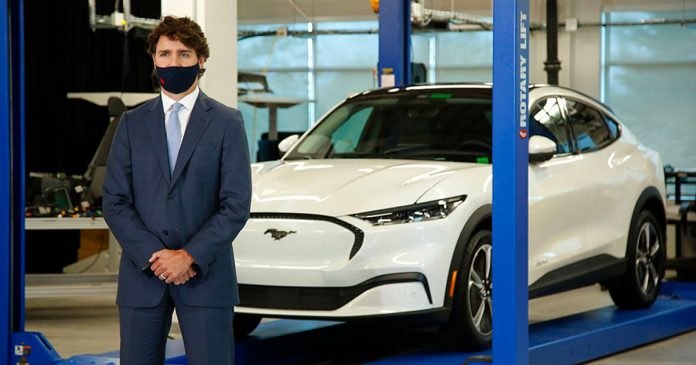The federal government has made it clear that it wants to get gas cars off the road and have you drive an electric vehicle (EV) instead. But even if you don’t decide to make the switch, how much will this push cost you through your electricity bill?
Nobody seems to know.
A new report from SecondStreet.org looks into the federal government’s ban on the sale of new gas-powered cars by 2035. Specifically, we asked provincial governments and utilities (which are responsible for electric grids within their borders) if they had any analysis on how the push for widespread EV adoption would affect Canadians’ power bills. None had any estimates.
While there aren’t any concrete numbers, there are many reasons the gas car crackdown could cost you big money on your utility bill.
For one, putting millions of EVs on the road will mean that a lot of new stuff needs to be built. Power plants to fuel the extra demand, big transmission lines to get that electricity into cities, towns and rural areas, upgrades to transformers and other local infrastructure, and thousands of EV charging stations.
All of that can’t be cheap. So who’s going to pay for it?
Manitoba Hydro gave us a fairly clear answer.
“If the utilities/ratepayers are to fund the necessary distribution system upgrades to power EVs then it will result in higher utility charges. Increases in utility costs, due to distribution system upgrades, would be spread across the entire rate base,” the utility said.
In short, everyone who pays a power bill will probably have to pay more to fund the government-mandated switch to electric cars.
Is this fair for an Albertan farmer who loves his Ford F-150 and maintains it for a decade after 2035? Or someone who lives in downtown Montreal and doesn’t even have a driver’s license, instead taking the Metro?
Another issue with this policy is that lower-income people will feel the pinch the hardest. Simply put, a bigger chunk of their paychecks goes towards paying the power bill. With the price of food, housing, and pretty much everything else going up, can people who are struggling really afford another jump in expenses?
The fact that nobody knows the cost is a major red flag for this policy, but we also uncovered a number of other problems with making everyone go electric.
EVs tend to be much heavier than their gas-powered counterparts. The Ontario government noted that this “causes exponential damage to pavement/bridges, leading to exponential costs associated with repair/replacement. This leads to increased emissions related to the repair/replacement of infrastructure, and premature asset depreciation.”
Do you think construction is bad in Winnipeg, Toronto and Regina now? The EV mandate could make it worse.
Outside of big cities, we have to consider people in northern and rural areas. Manitoba Hydro, again, had some good information, noting that “some isolated First Nations in Manitoba are serviced by long seasonal winter roads… there are no charging services along many of those routes nor would it be easy to supply them with existing distribution infrastructure.”
This isn’t just the case in Manitoba – there are certainly communities across the country in a similar situation.
These are just a few examples of major challenges with this idea.
There’s nothing wrong with buying an electric car. More competition is good in any industry. But if the federal government wants to push one particular option as the solution for an entire industry, they need to do their homework first.
The responsible thing to do would be to pause the gas-powered vehicle ban, figure out how a massive push towards EVs will impact Canadians’ power bills, and show that analysis to the general public.
Canadians might not support the ban after seeing how much it shocks their wallets.
Dom Lucyk is the Communications Director with SecondStreet.org, a Canadian think tank.





















